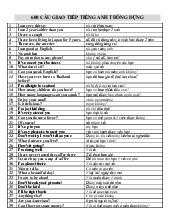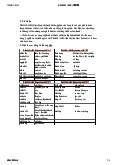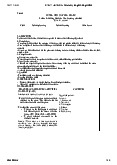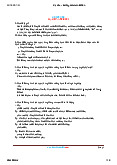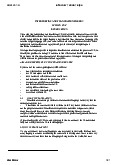


Preview text:
23:31 28/7/24 U4 Education and finance Education system problem in VN A. Schools
1. Provide outmoded teaching system -
The public education system we currently know has been around for
a long time. However, the basic schooling model remains the same. -
Students in Vietnam have to spend a lot of time studying (up to 8 hours a day) -
But the main point is they get the same classes every semester
(Math, Literature, Chemistry, you name it) with a variety of
homeworks and exams that they need to accomplish. Teaching
method is also a big problem. Roughly 40 to 50 kids of the same age
are crammed into a classroom and taught in a standardized way by a
teacher. It might be an optimal way to learn for some students, but
others struggle in this environment. Children learn best in different
ways. Some children are best suited to learn through visual
stimulation. Others may learn best through hands-on education. The
reality is that the current educational system doesn't really
accommodate any learning style, nor does it aim for anything other than high test scores. Solution -
The government should allocate the budget money to invest in the education
system. Consequently, students will inherit a better, more advanced education.
When we look at the bigger picture, according to the Economist this could lead to
the growth of the country’s overall economic health by increasing the gross domestic product (GDP). -
Teachers must be encouraged to develop new curriculum to teach new methods
and utilize technology resources to facilitate personalized learning by the diverse range of students. -
Moreover, as reported by a research from the University of Cambridge, formal
learning should start at age seven. This evidence relates to the contribution of
playful experiences to children’s development as learners and the consequences of
starting formal learning at the age of four to five years of age.
2. Lack of access to education about:blank 1/3 23:31 28/7/24 U4 Education and finance -
grading education. The national leaders could spend the state budget to build
infrastructure, support students’ families with difficult circumstances as well as
raise awareness of the general public, especially ethnic minority groups about the
importance of education. As a result of poverty, especially in remote or
mountainous areas, many Vietnamese adolescents could not have the opportunity to exposure with education -
This problem can be seen very clearly these days - during the covid-19 pandemic.
Childcare and early childhood education build a foundation upon which every
aspect of children’s development relies. The pandemic is putting that foundation
under serious threat. Many children don't have the equipment to connect and do
their online classes. They don't have computers or phones or even books because
of their family conditions. This brought an extra burden to families of young children -
Exclusion from school not only diminishes children’s individual potential, but also
fuels intergenerational cycles of poverty and disadvantage. Within the context of
Viet Nam’s rapid socio-economic development, children who fail to access quality
education also deprive the country from a source of dynamic growth. Solution -
As I mentioned before, the government plays an integral role in up -
Additionally, with the participation of various nonprofit organizations like
UNICEF, Blue dragon children’s foundation or Children in Vietnam,... The
youngsters could have more opportunities to go to school and have a better life B. Learners 1. Passive learning: -
We don’t ask a lot of questions
We as students rarely ask the teachers any extra questions even if we don’t have a full
understanding of the knowledge in classes - and this is considered normal. We are easy to
accept ideas in books and from teachers without questioning whether this piece of
information is valid or not. And I personally think that the parents and teachers are the
ones who should be responsible for building the habit of argumentation and reasoning at
an early age. Questioning generally helps in understanding the problems as well as the
reasons behind the solutions. This will develop your own skills of solving problems and
thinking independently. The case in our country is completely different from lessons in
Western countries. Students there confidently ask questions because people assume that
there is no such thing as a stupid or an ‘unnecessary’ question. They ask to improve their own skills. about:blank 2/3 23:31 28/7/24 U4 Education and finance -
We haven’t really answered the question “Why do we study?”
With a ‘degree mindset’, according to vnexpress.net, most students feel the need and
pressure to get into a famous university in order to secure good job opportunities at a very
young age. That explains why Vietnamese students’ youth is being robbed by schools. We
are very conditioned to the fact that someone will tell us what or when to study. But then
when we are in charge of our own or free to explore the world, it’s basically a mess. This
results in being lost without any guidance or help from teachers or parents. Evidenced by
this, students of all ages in Vietnam had lots of trouble reading books/journals for
academic purposes. Knowledge is fed, not sought for!
-> What I think could help in this case is teaching people to ask why, and helping them to find the answer
Q: Why do you have to learn Math and natural sciences if you are not going to
use trigonometry or chemistry for the rest of your life?
A: Because it’s more about the reasoning, the thinking of it. I’m sure studying
natural sciences helps organize your thinking and forces you to make decisions
with rational reasons, instead of guts feeling
-> There needs to be a motivation for learning, not a force of it. Students need to be
inspired, to see what stuff they can build with that piece of knowledge. So, to begin that
transformation process, we can start by:
+ Assessing the process of learning more than the product.
+ Create a safe environment where failure is just another opportunity to try again and improve.
+ Provide more learner-centered and career-oriented classes at a young age.
Students are building the foundation to a better future of our country, so we have to work
harder than anyone else. Making active learning doesn’t feel like learning because it is
afterall referred to as a deeply satisfying way to learn. Instead of a linear movement
through the curriculum, active learning allows us to grow through self-directed
challenges that are difficult, but not overwhelming. The ultimate goal is to be capable of
making decisions later in life confidently based on our knowledge and experience, not on
textbooks or in a structural way. about:blank 3/3
